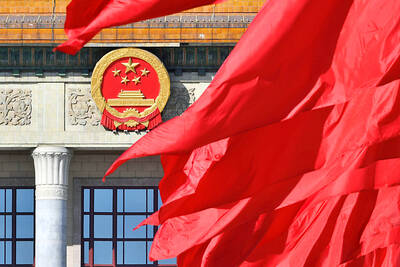A Taiwanese soap opera that is a hit throughout East Asia has been banned by China as a threat to young minds.
Chinese parents had complained about Meteor Garden, (
The series had begun to air on some Chinese television stations last month, but was banned March 8 by the State Administration of Radio, Film and Television.
"This soap opera has had a negative effect on society and especially misled young people," a spokeswoman for the agency said yesterday. She refused to give her name or any other details of the reason for the ban.
Meteor Garden centers on the romance between a poor girl and a member of a gang of spoiled rich kids at an elite high school in Taipei. Gang members wear expensive designer clothing and pick on fellow students with impunity.
The newspaper Beijing Youth Daily (
State media didn't give specifics about Chinese complaints. But newspapers in Taiwan have said Chinese parents objected to the drama's depiction of school violence and indulgence with brand-name goods and other extravagances.
The ban highlights the conflict between China's growing appetite for imported pop culture and the government's insistence on managing what its people see and hear.
Meteor Garden has been an international success in East Asia, drawing large audiences in Hong Kong, Indonesia, Singapore and Taiwan. The series is based on a Japanese comic book of the same name.
Tsai Chih-ping (柴智屏), producer of Meteor Garden, was quoted by local media as saying it is about young people growing up by learning from their mistakes.
"Many youngsters have gone through the same experience. We are most surprised by the ban," she was quoted as saying.
The series is still available in China on pirated video discs.

US PUBLICATION: The results indicated a change in attitude after a 2023 survey showed 55 percent supported full-scale war to achieve unification, the report said More than half of Chinese were against the use of force to unify with Taiwan under any circumstances, a survey conducted by the Atlanta, Georgia-based Carter Center and Emory University found. The survey results, which were released on Wednesday in a report titled “Sovereignty, Security, & US-China Relations: Chinese Public Opinion,” showed that 55.1 percent of respondents agreed or somewhat agreed that “the Taiwan problem should not be resolved using force under any circumstances,” while 24.5 percent “strongly” or “somewhat” disagreed with the statement. The results indicated a change in attitude after a survey published in “Assessing Public Support for (Non)Peaceful Unification

The CIA has a message for Chinese government officials worried about their place in Chinese President Xi Jinping’s (習近平) government: Come work with us. The agency released two Mandarin-language videos on social media on Thursday inviting disgruntled officials to contact the CIA. The recruitment videos posted on YouTube and X racked up more than 5 million views combined in their first day. The outreach comes as CIA Director John Ratcliffe has vowed to boost the agency’s use of intelligence from human sources and its focus on China, which has recently targeted US officials with its own espionage operations. The videos are “aimed at

‘MISGUIDED EDICT’: Two US representatives warned that Somalia’s passport move could result in severe retaliatory consequences and urged it to reverse its decision Minister of Foreign Affairs Lin Chia-lung (林佳龍) has ordered that a special project be launched to counter China’s “legal warfare” distorting UN Resolution 2758, a foreign affairs official said yesterday. Somalia’s Civil Aviation Authority on Wednesday cited UN Resolution 2758 and Mogadishu’s compliance with the “one China” principle as it banned people from entering or transiting in the African nation using Taiwanese passports or other Taiwanese travel documents. The International Air Transport Association’s system shows that Taiwanese passport holders cannot enter Somalia or transit there. The Ministry of Foreign Affairs (MOFA) protested the move and warned Taiwanese against traveling to Somalia or Somaliland

SECURITY: Grassroots civil servants would only need to disclose their travel, while those who have access to classified information would be subject to stricter regulations The government is considering requiring legislators and elected officials to obtain prior approval before traveling to China to prevent Chinese infiltration, an official familiar with national security said yesterday. President William Lai (賴清德) in March announced 17 measures to counter China’s growing infiltration efforts, including requiring all civil servants to make trips to China more transparent so they can be held publicly accountable. The official said that the government is considering amending the Act Governing Relations Between the People of the Taiwan Area and Mainland Area (臺灣地區與大陸地區人民關係條例) to require all civil servants to follow strict regulations before traveling to China.